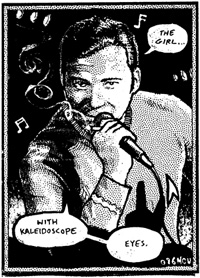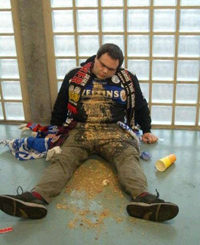
Bill Shatner: Now He Belongs
by Dave Liljengren
illustration by Mediocre Concepts Unlimited
At Lincoln’s Tomb in Springfield, Illinois (the Lincoln Monument is in Washington, DC) a great hush fills the center room under which the remains of the dead president are buried. Mourners still trod silently through the granite mausoleum. A fifty-star flag is draped over the sarcophagus and chiseled in large letters on the wall are the words, “Now He Belongs to the Ages.”
I thought of that phrase recently. I had found, in full, a reissue of The Transformed Man by William Shatner (Varese Sarabande Records) while looking for a Jerky Boys CD to give my nephew for this thirteenth birthday. Shatner’s spoken word CD, recorded at Star Trek‘s apex, 1968, and released then on Decca, was in the “Comedy” section at Borders Books, lest we fear unreconstructed Trek zealots out there still not in on the joke. On it, Shatner reads from Shakespeare, Dylan (Bob), Lennon-McCartney, and others. It should surprise no one that Shatner stirs souls reading Shakespeare. Though Rescue 911‘s reigning hambone would probably lose a battle of the bards against successor captain, Patrick Stewart, over-the-top was always his stock in trade and he makes even a Velveeta-eating, Free-Vee watching, Deep Space Nine-despising butterball like myself want to run off to fight Frogs and Dauphins by the time he yells “God for Harry, England, and St. John!!!” at the end of the kickoff track, a war cry from Henry the Fifth.
At the other extreme, TJ Hooker’s take on “Mr. Tambourine Man” and “Lucy in the Sky With Diamonds” shows a tin ear for psychedelia that should also surprise no one. His halting delivery and simpering tone portray Lennon and Dylan, with their mind-expanding adventures, as dazed, pathetic followers unfit for the bridge of the Enterprise.
This is likely due to a macho form in the actor and his then venue. Even in these revisionist days it’s hard to find a show as supportive of the Vietnam War as the classic Trek episode “A Private Little War” where the Klingons arm the village tribes and encourage them to hunt hill dwellers. Kirk gives flintlock rifles to the hill people and the nattering doctor pesters him, asking, “What about the prime directive, Jim?” “It’s the right thing to do,” the toupeed one says, “Everything must be kept in balance. Balance, Bones… balance.”
General William Westmoreland, for a time commander of the American forces in Vietnam, couldn’t have said it better. Further, even though James Tiberius Anti-Communist was known to have a personal hero in the Great Emancipator Abe, his testosterone-squirting ethic of sacrificing a few for the good of the many – a relatable inverse to the Viet Cong “body count” tallies that Westmoreland used to assure White House leaders that victory was at hand in Vietnam – is seen in Kirk’s willingness to lose a new away team member each week, making Dr. McCoy’s crisp, “He’s dead, Jim,” a catch phrase, and Kirk’s misty, ruminative silences a familiar sight. We understood then the message in Kirk’s silence: “Let the doctor mourn the loss, but a man’s man, whether he be a ship’s captain or an omelette chef, knows he’s got to scramble some eggs to get the job done…”
Peaceniks, loose cannons, lone adventurers, and heroes in rock ‘n’ roll songs had no place in Asian wars or the space program, and the TV barons signing Shatner’s checks profited best when leading cheers for the established order. What we learned after Star Trek‘s cancellation, the Tet offensive, and the crash and burn of hippiedom, is that the only balance achievable in those lamentable wars was in degree of suffering, and, as history has borne out, even Billy “the Body Counter” Westmoreland’s sacrifices of the few may not have benefited as many as directly as was first believed.
Shatner’s original liner notes, reproduced on the CD from the ’60s vinyl (and probably mono) version, add little to the CD, the myth of Shatner as raving egotist, or to any possible explanation of his authorial success. Shatner has written a series of popular science fiction novels, all with the word “Tek” in the title. Here, colorless jacket notes thank the orchestrators and producers assisting Shat, who, in turn, reveal he was born in Canada, loves theater, and works hard. No pansy-boy thespian he.
Shat’s northland origins are a small revelation, but it did buttress a growing hypothesis of mine. Specifically, when individuals live far from pop-cultural centers and are deprived of mind candy, they fantasize in the hypertechnicolor of the popular imagery they only occasionally get to see and allow it too much importance, thereby living in God-and-Country cinematic fantasies long after the credits have rolled.
In contrast, urban individuals, sickened with choice and overcome with escapist options, are much quicker to turn from false lights to more concrete, albeit more cynical, illusions, like espresso and armed robbery. Fictional Gatsby, undone via over-reliance on daydreams, was, like my brother, from the pig farms and cold winds of western Minnesota. Anchor Peter Jennings – like Shatner, a Canuck – has never let the mask down and seems to persist in a belief in the virtuous efficacy of the fourth estate even as other infotainment stars allow some discussion of the matter. I know not of Kathie Lee Gifford’s origin, but I’d be willing to wager there are cold winds, corn fields, Homecoming Queens, and drum majorettes running through it. It matters not whether the belief is in God, Harry and England, or Cody, Frank and Regis, the hinterlands grow the true believer.
All this has little to do with Transformed, but its value, if any, lies in its ability to generate a few reflective moments (and not all, or even any, of those reflections need be serious, or even consequential) on four ubiquitous cultural elements – Shakespeare, Dylan, the Beatles, and Star Trek – we often see and seldom understand. That a B-grade actor combined the four, and that anyone still cares three decades later, imbues this piece of absurd Americana with pop-psychological voodoo it may take years and thousands of reruns to understand. With Shatner performing Shakespeare in our living rooms, in a format that can never be canceled or taken away, we can truly say of Captain Kirk, like his presidential hero Lincoln, “Now He Belongs to the Ages.”



